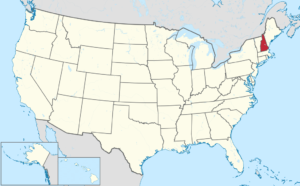 New Hampshire is a state that is filled with natural beauty. The sun shines brightly and consistently over the year. It is known for its maple syrup and the northern mountains. All the natural resources give a compelling reason to go solar in this state.
New Hampshire is a state that is filled with natural beauty. The sun shines brightly and consistently over the year. It is known for its maple syrup and the northern mountains. All the natural resources give a compelling reason to go solar in this state.
New Hampshire started pioneering solar power way back. The General Court passed the Renewable Portfolio Standard in 2007, making it one of the first states to do so.
As a homeowner, you want to generate massive savings by investing in solar. You can combat the ever-rising utility costs altogether by avoiding them.
Even though the state is generally cold, it makes an excellent environment to have solar panels. Solar panels require sunlight and not heat to generate energy. The sunny, cool days make solar panels produce disproportionate high power.
Going solar is the best option because you will save the environment while saving cash by not paying utility bills. Coupled with all the incentives and rebates, this makes investing in solar in New Hampshire a good idea.
Contents
- 1 Key Takeaways
- 2 Introduction
- 3 New Hampshire Renewable Portfolio Standard (RPS)
- 4 Federal Solar Tax Credit
- 5 Net Metering In New Hampshire
- 6 Property Tax Exemption
- 7 Case Study: Residential Solar Panel Installation in Concord, New Hampshire
- 8 Expert Insights From Our Solar Panel Installers About Solar Panel Laws in New Hampshire
- 9 Experience Solar Excellence with Us!
Key Takeaways
- New Hampshire has favorable conditions for solar power due to consistent sunlight and high electricity costs, resulting in a relatively short payback period for solar investments.
- New Hampshire has progressive solar panel laws, including a Renewable Portfolio Standard (RPS) with a solar carve-out, a Federal Solar Tax Credit, net metering policies, and property tax exemptions to incentivize and support residential solar adoption.
- The state’s RPS aims to produce over 24% of energy from renewables, with a 0.3% carve-out for solar energy, and the Federal Solar Tax Credit allows homeowners to deduct 30% of their solar system’s total cost from their taxes. Net metering enables solar PV owners to use the grid as a battery and offset electricity bills with earned credits. Property tax exemptions promote solar installation without increasing property taxes.
Introduction
An average home can be supported using a 5 kW solar PV system. Installing a 5 kW system for your house can set you back about $25,000. Combined with the tax credits and incentives, the payback period for such an investment is ten years.
The short payback period is attributed to the high cost of electricity. Consumers pay an average of $0.18 per kWh. This is more than the nation’s average. These are just averages, but they depict how much savings one can generate by investing in solar power.
New Hampshire has led in formulating solar power and renewable energy policies. Most incentives and rebates were introduced over a decade ago and are still active today. Here are the various solar panel laws in New Hampshire.

New Hampshire Renewable Portfolio Standard (RPS)
A Renewable Portfolio Standard (RPS) policy requires utilities to produce a certain percentage of their energy using renewable means.
New Hampshire has a very impressive RPS that has been in effect since 2007. The states aim to produce 24.8% or more of their energy from renewable sources. An RPS is excellent for homeowners as residential solar systems count towards utility targets. This means utilities offer rebates and incentives to get people on the bandwagon.
The RPS also has a set solar carve-out that indicates that a certain RPS plan percentage must be achieved through solar energy production. The carve-out is set at 0.3%. Though it is nice that the state has a solar carve-out, it still could aim higher and encourage solar energy utilization.
Federal Solar Tax Credit
Also known as the Investment Tax Credit, this scheme incentivizes the federal government to get homeowners to go solar. The tax credit allows you to deduct 30% of your PV system’s total cost from your taxes.
This means that you can deduct 30% of your solar system’s cost from the taxes you owe the government.
The total cost includes the solar panel, installation, and other auxiliary components.
You can deduct the whole amount from the taxes you pay in a single year. If you don’t pay enough taxes to reclaim all the cash at once, you can split it into subsequent years until you are fully compensated.
You only qualify for the tax credit if you buy a whole solar PV system. Either by cash or using a solar loan. To achieve maximum savings, it is recommended you pay cash.
If you are low on capital, you can take a solar loan, qualify for the tax credit, and use the amount to pay for your system’s first installments.
Net Metering In New Hampshire
The net metering policy was set up together with the RPS. Net metering is a scheme that allows households that have invested in solar power to remain connected to the grid.
Solar PV owners can use the grid as a battery for their systems. When your solar power produces more power than your household needs, the grid adopts the excess power to be used elsewhere. When you send electricity to the grid, you earn credits.
When there’s not enough sunlight to make your solar panels produce enough power for your needs at night or during wintertime, you can derive power from the grid to meet the deficit.
The credits you earned will be used to offset your electricity bill.
New Hampshire allows homeowners to decide how utilities can compensate them for their credits. You can choose to be compensated financially, at a cost determined by the utility, or you can choose to be compensated with credits that roll over to subsequent months.
Property Tax Exemption
The value of your house and property determines how much property taxes you pay. When you install solar PV in New Hampshire, it increases the value of your home.
New Hampshire has exempted solar from being included in property taxes. You get to add value to your house and don’t have to pay extra taxes.
New Hampshire has no sales tax, so you will not have to pay for sales tax when acquiring your solar PV.

Case Study: Residential Solar Panel Installation in Concord, New Hampshire
Background
Concord, New Hampshire, known for its natural beauty and consistent sunshine, is an ideal location for solar energy adoption. With progressive solar panel laws, including the Renewable Portfolio Standard (RPS), federal tax credits, and property tax exemptions, New Hampshire provides a supportive environment for homeowners looking to invest in solar power. The Hansen family, residing in Concord, decided to capitalize on these incentives to reduce their energy costs and environmental impact.
Project Overview
The Hansen family aimed to transition their home to solar power, leveraging New Hampshire’s favorable solar laws. They partnered with Solar Panels Network USA to design and implement a solar energy system tailored to their needs. The project focused on maximizing energy efficiency, reducing carbon footprint, and achieving long-term cost savings.
Implementation
The project began with a comprehensive assessment of the Hansen family’s home and energy requirements. Solar Panels Network USA’s experienced team handled the design, permitting, installation, and integration phases seamlessly, facilitated by New Hampshire’s flexible solar laws.
- Design and Planning: A site survey was conducted to evaluate the roof’s suitability for solar panels. The team designed a system comprising high-efficiency solar photovoltaic (PV) panels and an energy storage solution to optimize energy production and usage.
- Permitting and Approvals: The new solar laws streamlined the permitting process, enabling quicker approvals from local authorities and utility companies. The RPS policy, which mandates a certain percentage of energy from renewable sources, further supported the project.
- Installation: The installation involved mounting solar panels on the roof, setting up inverters, and connecting the system to the home’s electrical grid. Advanced installation techniques ensured minimal disruption to the family’s daily activities.
- Net Metering Integration: The project included the implementation of a net metering system, allowing the Hansens to feed excess electricity back into the grid. This system enabled them to earn credits during high-production periods, which could be utilized when solar production was lower.
Results
The Hansen family’s transition to solar energy delivered significant benefits:
- Energy Savings: The family experienced a substantial reduction in their monthly electricity bills, with savings averaging 50% compared to their previous utility costs. This was facilitated by the state’s net metering policies, which allowed them to offset their electricity bills with earned credits.
- Environmental Impact: By switching to solar power, the Hansen family reduced their carbon footprint by approximately 7 tons annually, aligning with New Hampshire’s environmental goals.
- Increased Property Value: The installation of solar panels increased the market value of their home, providing a potential return on investment if they decide to sell in the future.
- Energy Independence: The inclusion of an energy storage system allowed the Hansens to achieve greater energy independence, providing a reliable power source during outages and reducing reliance on the utility grid.
Summary
The residential solar panel installation for the Hansen family in Concord, New Hampshire, underscores the positive impact of the state’s progressive solar laws. By utilizing incentives such as the RPS, federal tax credits, and property tax exemptions, the Hansens were able to make a cost-effective and environmentally friendly transition to solar energy. The project not only provided significant energy savings and environmental benefits but also increased the property’s value and enhanced the family’s energy independence. This case study exemplifies the potential for widespread residential solar adoption in New Hampshire, showcasing the state’s leadership in renewable energy and sustainable living.
Expert Insights From Our Solar Panel Installers About Solar Panel Laws in New Hampshire
New Hampshire’s commitment to renewable energy is impressive. The state’s Renewable Portfolio Standard, coupled with net metering and tax incentives, makes it easier and more affordable for homeowners to switch to solar power. This not only reduces their energy bills but also contributes significantly to environmental sustainability.
As a solar installer with years of experience, I can confidently say that New Hampshire’s solar laws provide a robust framework for residential solar adoption. The combination of federal tax credits and state incentives creates a compelling financial case for homeowners to invest in solar energy.
The property tax exemptions in New Hampshire are a major advantage for homeowners. By exempting the added value of solar installations from property taxes, the state encourages more residents to go solar without the worry of increased property tax bills.
Experience Solar Excellence with Us!
Trust in Solar Panels Network USA, where our seasoned experts deliver top-quality solar solutions for homes and businesses nationwide. With a legacy of countless successful installations and a commitment to sustainable energy, we’re your reliable partner in the solar journey. Ready for a brighter, eco-friendly future? Call us now at (855) 427-0058 and harness the power of the sun!
Map image by Wikimedia Commons User: TUBS / CC-BY-SA-3.0
About the Author
Solar Panels Network USA stands at the forefront of solar energy solutions, driven by a team of seasoned solar engineers and energy consultants. With over decades of experience in delivering high-quality solar installations and maintenance, we are committed to promoting sustainable energy through customer-centric, tailored solutions. Our articles reflect this commitment, crafted collaboratively by experts to provide accurate, up-to-date insights into solar technology, ensuring our readers are well-informed and empowered in their solar energy decisions.

